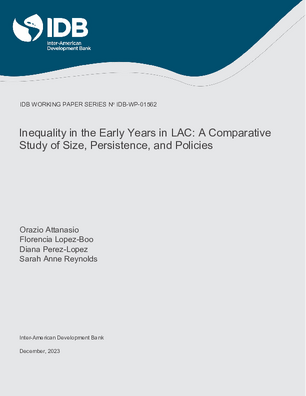Inequality in the Early Years in LAC: A Comparative Study of Size, Persistence, and Policies
Date
Dec 2023
Gaps in child development by socioeconomic status (SES) start early in life, are large and can increase inequalities later in life. We use recent national-level, cross-sectional and longitudinal data to examine inequalities in child development (namely, language, cognition, and socio-emotional skills) of children 0-5 in five Latin American countries (Chile, Colombia, Mexico, Peru and Uruguay). In the cross-section analysis, we find statistically significant gaps with inequality patterns that widely differ across countries. For instance, gaps in language and cognition for Uruguay and Chile are much smaller than those for Colombia and Peru. When turning to the longitudinal data, average SES gaps are similar to those of the cross-section in language but differ substantially in cognition, mainly in Uruguay where they emerge as more unequal when cohort effects do not operate. Importantly, we also find that the ECD gaps found at early ages (0-5), still manifest 6-12 years later in almost all locations and realms in which we have measures of early child development, but they do not increase with age. Results are robust to using different measures of inequality (income and maternal education). Gaps are smaller but generally remain when adjusting for possible explanatory factors (e.g., family structure, parental education, geographic fixed effects). To reduce ECD inequality and promote equality in later life outcomes, policymakers should look to implementing evidence-based interventions at scale to improve developmental outcomes of the most disadvantaged children in society.




